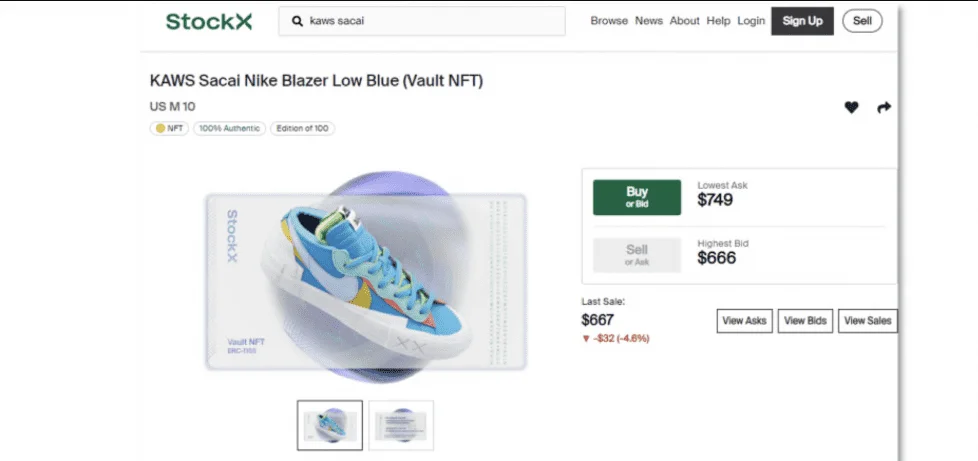The NFT sneakers that prompted the lawsuit against StockX are still available online.

Nike has kicked off the “licensed NFT” warfare by suing an online reseller named StockX for trademark infringement or the sale of unauthorized nonfungible token (NFT) footwear.
Nike vs StockX
According to Reuters, Nike has filed a lawsuit against the reseller in New York Federal court, seeking an undisclosed amount in damages as well as a halt to sales of such virtual items. StockX apparently began selling Nike sneaker NFTs in January, promising purchasers that they will be able to redeem the real-world versions of the footwear in the near future.
Nike stated in its 50-page case that StockX sold over 500 NFT sneakers with Nike logo, tarnishing their name and credibility. The footwear business also claimed that the NFT sneakers were marketed at exorbitant rates with “murky terms of purchase and ownership.”
StockX is a well-known online retailer with a market capitalization of $3.8 billion, and the NFT shoes that are the subject of the case are still available for purchase. The series is named ‘The Vault,’ and it consists of 9 premium Nike sneakers that deal with NFTs that are linked to real-world assets.

Nike claims that NFTs allow businesses to communicate with their customers, but some market participants are attempting to “usurp the goodwill of some of the world’s most recognized trademarks and exploit those trademarks without authority to advertise their virtual products and create ill-gotten riches.” The shoemaker will release its own NFTs line later this month in collaboration with the recently acquired art company RTFKT.
Because of its popularity, NFT has become a main PR and marketing tool for corporations and celebrities. NFTs, like every other popular use case in the decentralized world, have reached a threshold of abuse.
Aside from Nike, there have been numerous additional cases involving prominent businesses and celebrities involving NFTs. Miramax, the film production firm behind Pulp Fiction, sued the film’s director, Quentin Tarantino, for selling NFTs of the film, claiming copyright infringement.
NFTs in sports
The ability for fans to buy, rather than simply see, licensed digital media of their favorite sporting events would very certainly solidify non-fungible tokens’ role in the sports content sector.
What sports enthusiast wouldn’t want to purchase a memorable sporting event? Nonfungible tokens (NFTs), which are unique digital identities that use blockchain to record media ownership, are now allowing them to do so. According to Deloitte Global, NFTs for sports media would produce more than US$2 billion in transactions in 2022, nearly double the number for 2021.
We anticipate that 4–5 million sports enthusiasts worldwide will have acquired or been given an NFT sports collectable by the end of 2022. Interest in sports NFTs is projected to be fueled by activity in the broader NFT market, which includes digital art, the top five most valued sales of which had produced more than US$100 million by August 2021. 2
The most likely reason Nike went to court
NFTs enable the demonstration of ownership and usage rights for any piece of digital information by assigning the item a unique, non-duplicable identifier that is stored on a distributed database, or blockchain, generally Flow or Ethereum.
Although ownership of an NFT may include ownership of the underlying digital asset, the majority of sports NFTs sold to date have no ownership or use rights in the underlying media. Each NFT has a smart contract whose conditions are forever applicable and which executes instantaneously and irrevocably with each trade.
Each NFT is one-of-a-kind in the same manner that each limited edition physical print is individually numbered but otherwise similar. NFTs, in this way, create preset scarcity in digital material. They’re the digital version of traditional sports trading cards, which sold for millions of dollars each in 2021 and have long been an important cash source for clubs and leagues, particularly in the US market.
NFTs basically meet the same demands as cards, but swap out still photos for digital stills or video, cardboard for pixels, binders for digital displays (mainly smartphones), collectors’ fairs for online trading platforms, and third-party verification agencies for blockchain.
NFTs are also a great way to strengthen ties with fans. Rightsholders should think about how they may use NFTs to improve the fan experience by allowing them to purchase and display NFTs of their team, as well as participate in choices like the player of the month (in Japan), or even which songs are played during game intervals (in Italy).
NFTs may also be utilized inside fantasy sports league applications in some situations, with each NFT representing a player who might be part of a team competing in season-long contests.
As the breadth of NFTs expands, an extra category may include athlete-designed or -branded digital replicas of actual-world products that only exist digitally, such as sneakers.
The Gucci Virtual, for example, is a digital shoe design that can only be worn through augmented reality. Again, some may be bewildered by this, but others may be similarly perplexed by the selling of a pair of actual shoes for US$1.8 million or the buying of digital skins by tens of thousands of video game players.

